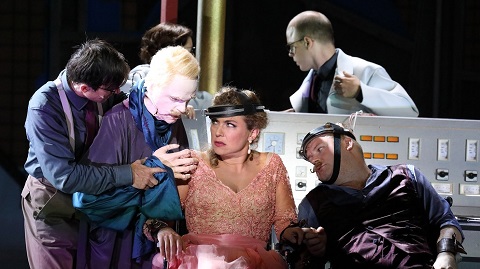Bayerische Staatsoper, 2017
Ivor Bolton, Nikolaus Habjan, Julian Prégardien, Alyona Abramowa, Annette Dasch, Brenden Gunnell, Rachael Wilson, Johannes Kammler, Anna El-Khashem, Manuela Linshalm, Daniel Frantisek Kamen, Sebastian Mock
Staatsoper.TV - 30th July 2017
The spirit and influence of Mozart's The Magic Flute weighs heavily upon Carl Maria von Weber's Oberon, König der Elfen, although it has more of a mythological quality and less of the masonic rituals. To bring it a little more down to earth in terms of human feelings and away from the fairies, the opera also borrows from the romantic complications of Mozart's Die Entführung aus dem Serail, where the constancy of love is put to the test. It's a kind of experiment then, and this aspect is very much taken up in the Bavarian State Opera's entertaining production for their 2017 summer festival.
Oberon and Titania, like Sarastro and the Queen of the Night, are unable to reconcile their views on mankind, specifically on their capacity to love and remain constant and faithful in such matters, and they decide to conduct an experiment. Oberon selects a brave knight, Huon von Bordeaux to be his champion, his Tamino, with Scherasmin his valet as his Papageno. He is given a vision of a beautiful young maiden, Rezia, the daughter of the Caliph of Baghdad and the young knight is immediately enchanted, singing a Tamino-like 'Dies Bildnis ist bezaubernd schön' style aria.
The Magic Flute parallels continue to come with not one but three Pucks being in service to Oberon and the two adventurers being gifted with magical objects that will aid them on their quest: Huon, a horn, and Scherasmin a magic goblet. Immediately on their arrival in Baghdad, Huon is attacked by a fierce lion which he manages to overcome. Once in the caliph's court, where Huon helps Rezia escape from an unwelcome marriage to Prince, the opera becomes a little more Die Entführung aus dem Serail-like in its treatment.
Like The Magic Flute, and indeed Die Entführung aus dem Serail, the spirit in which the opera is played has a lot to do with how successfully it comes across. Nikolaus Habjan's production takes the 'experiment' side of the work at a little more literally, setting the production in a science laboratory where 'Oberon' and 'Titania' are scientists. The humans are not spirited away to Baghdad, but with a few puppet props (and a very large one for Oberon), and with the assistance of a 'magic spell' (delivered via hypodermic needle), the ordinary humans are led to believe that they have been transformed into knights on a noble quest to win the love of a beautiful damsel and her maid.
The distancing effect of this framing from a fairy tale is by no means a way to allow the work to be looked on ironically or in an inappropriately serious deconstruction, but rather as a way of making it even more playful. And perhaps a little more human. At the same time however, it's important to retain some of the magic and wonder of the fairy tale, and the Austrian director does that wonderfully by drawing on the traditional puppet shows that he grew up watching. Here they are full-sized puppets, used mainly for the Arabian characters and operated by technicians in the laboratory, and they do successfully inject a larger-than-life quality to the work.
It's a simple twist on the story, but one that is enough to lift it out of an antique fairy tale structure into the realm of the modern day without losing the essential magic spirit and the colourful character of the original work. Still, there aren't too many challenges faced by our 'heroes' in the first half of the story. As they make their escape on a ship to Greece in the second part of the work, Titania thinks that things need shook-up a little, and - in full Queen of the Night mode - she sends a huge storm to see how constant the couples remain when some turbulence is thrown their way.
And a few challenges are exactly what the opera itself needs, having coasted along fairly easily on the tails of Mozart for the first half. Weber rises to the challenge with some lovely choruses and a huge dose of Romanticism that provides plenty of opportunity for spectacle with musical and singing fireworks to match. The production, the singing and the musical performance from Ivor Bolton all live up to those requirements as well. Brenden Gunnell is excellent as Huon, exhibiting a fine lyrical Tamino-like tenor and fully entering into the spirit of the piece. Annette Dasch is no less committed as Rezia, bringing considerable character to the role, even if she doesn't always land well when she launches at those high notes.
Oberon, König der Elfen is certainly less well known than Weber's classic Der Freischütz, but it's an enchanting piece. It's less ambitious than Mozart in sentiment and execution and certainly doesn't have the same musical genius or memorable pieces, but it has considerable character of its own, particularly when a good production like this shows its merits.
Links: Bayerische Staatsoper, Staatsoper.TV


